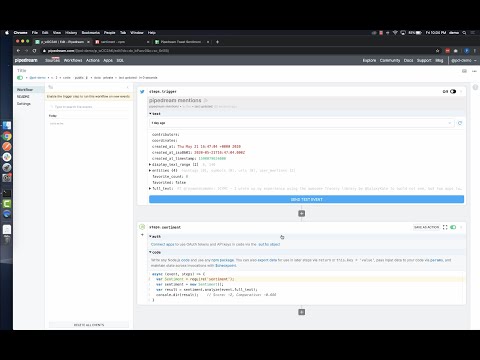What do you want to automate
with Codacy and Google Sheets?
Prompt, edit and deploy AI agents that connect to Codacy, Google Sheets and 3,000+ other apps in seconds.
Trusted by 1,000,000+ developers from startups to Fortune 500 companies
Popular Ways to Connect Codacy with Google Sheets#
Popular Codacy and Google Sheets Triggers#
Emit new event each time a comment is added to a spreadsheet.
Emit new event each time a row or rows are added to the bottom of a spreadsheet.
Emit new event each time a row or rows are added to the bottom of a spreadsheet.
Emit new event each time a row or cell is updated in a spreadsheet.
Popular Codacy and Google Sheets Actions#
Delete integration for the authenticated user. See the documentation
Add a single row of data to Google Sheets. Optionally insert the row at a specific index (e.g., row 2 to insert after headers, shifting existing data down). See the documentation
Get the authenticated user on Codacy. See the documentation
Add multiple rows of data to a Google Sheet. See the documentation
Overview of Codacy#
The Codacy API lends itself to automated code review and analysis within Pipedream's serverless platform. By wielding this API, you can craft workflows that trigger on code pushes, scrutinize code quality, enforce coding standards, and seamlessly integrate with other tools for broader development process automation. It's a gateway to embed code quality checks into your CI/CD pipeline, get real-time alerts, and keep your codebase healthy, all within the Pipedream ecosystem.
Connect Codacy#
import { axios } from "@pipedream/platform"
export default defineComponent({
props: {
codacy: {
type: "app",
app: "codacy",
}
},
async run({steps, $}) {
return await axios($, {
url: `https://app.codacy.com/api/v3/user`,
headers: {
"Accept": `application/json`,
"api-token": `${this.codacy.$auth.api_token}`,
},
})
},
})
Overview of Google Sheets#
The Google Sheets API allows for the creation, reading, updating, and deletion of data within Google Sheets, enabling a robust platform for spreadsheet management and data manipulation. Through Pipedream, you can craft serverless workflows that respond to various triggers, such as webhook events, emails, or scheduled times, to interact with Google Sheets. This synergy can automate reporting, synchronize data across applications, manage inventory, track leads in a CRM, or even conduct survey analysis by updating and retrieving sheet data on the fly.
Connect Google Sheets#
import { axios } from "@pipedream/platform"
export default defineComponent({
props: {
google_sheets: {
type: "app",
app: "google_sheets",
}
},
async run({steps, $}) {
return await axios($, {
url: `https://www.googleapis.com/oauth2/v1/userinfo`,
headers: {
Authorization: `Bearer ${this.google_sheets.$auth.oauth_access_token}`,
},
})
},
})
Related Videos#



Community Posts#


